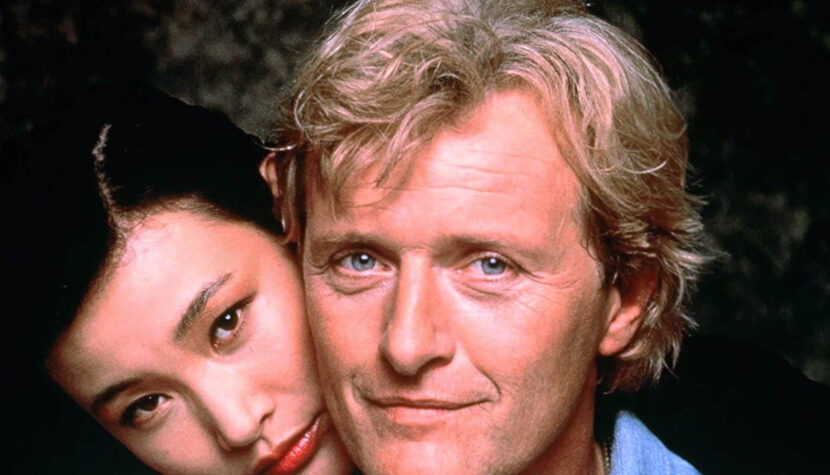WEDLOCK. The End of Rutger Hauer’s Career?

Maybe it ended earlier, around the vicinity of The Blood of the Heroes? In 1994, there was another highly underinvested and niche film titled Vaterland directed by Christopher Menaul. I still remember the brand new plastic wrap on the VHS cassette and a fairly good quality cover design, at least on the first page, considering those times. In Vaterland Rutger Hauer shone a bit more, but that was already the end. However, did he truly give his best as an actor in Wedlock as some claim, reminding us of the legend he was in the 80s? It’s a fact that without him, the production wouldn’t even be average.
Speaking of Rutger Hauer’s career ending, of course, I don’t mean that he disappeared from the cinema. He played many better and worse roles, but gradually moved to the background and into episodic roles. However, from the 80s, we remember him as an extraordinary villain and a charismatic protagonist. He dominated the screen and left an impression on the audience. This state couldn’t last forever, but it lasted too briefly. In the 90s, Rutger Hauer didn’t find himself as a main character in stories anymore. But did he really succeed in Wedlock?
Let’s start with the fact that older science fiction films often used the term “sometime in the future” or something similar to justify the lack of stylized presentation of the depicted world and thereby reduce costs. This happened with Wedlock. The near future is essentially our contemporary reality, which is already in the past today. Even then, in the early 90s, the production atmosphere was surprisingly retro, like from the 80s. All due to a small budget. Technological changes in the future were concealed by cheap set designs, the portrayal of a layered, poor society, and the prison. Looking back, it appears overly television-like, cramped, and even theatrical. Within the realm of science fiction, you can only see details that are too discreet to form a coherent future world. As always, the music wasn’t cared for either – renowned composers cost a fortune, and it shows, not always stylistically innovative, but still audible. Blood doesn’t look like blood, fighting heroes often don’t touch each other during blows, and the futuristic super-prison is equipped only with old Land Rover cars. The core of the plot is interesting, but its development is painfully standard, lacking twists, with a stereotypical villain character. Of course, the prison warden had to be evil, and the friend had to betray. The women in the film, although beautiful, are extraneous to the main character’s fate, forcibly attached to him. The downfall of the production is its sound design.

But how does the legendary Rutger Hauer fare? Opinions on the quality of his role in the film are quite contradictory. Some believe he played brilliantly, but they might be driven solely by irrational sentiment, while others notice that the icon of Blade Runner didn’t put in much effort at all. They have a point. Even in his movements, you can see the actor’s sluggishness. There were few doubles in the film. Hauer improvised a lot, which is evident. Sometimes, he mixed up his movements, but shots weren’t repeated, although they could have been reviewed, analyzed, and shot better. However, there wasn’t money or time for that. Objectively, it must be stated that this isn’t one of Rutger Hauer’s better roles. He performed much better in Vaterland, a film three years later, which was much more polished in terms of the quality of its depicted world, imagining a scenario where Nazi Germany won World War II. Through the character Xavier March, he managed to present a tragic and charismatic hero, something that didn’t come across in Wedlock. Perhaps it would have been better if the script allowed the brilliant electronics expert Frank Warren to not so vehemently feign dislike for women. A significant portion of his journey with Tracy Riggs is filled with rather artificial arguments about crossing the boundaries of closeness, something Frank vehemently avoids. Moreover, as the film progresses, the science fiction atmosphere diminishes, and the film transforms into a standard B-class action story from the 80s. The ending is the culmination of this predictable work, and as a viewer, I’m saddened that Rutger Hauer’s legend was too short-lived, as it faded already in the early 90s. However, all is not lost; in later years, the actor managed to return to the big screen, not in the leading role but regularly leaving his mark, such as with Christopher Nolan and Robert Rodriguez.

As for the film Wedlock back in the VHS era, I watched it with excitement. Today, it’s hard for me to find an appropriate summary in words other than to say with regret that I don’t have the desire to revisit this production. However, I coincidentally found a good description online (scifimoviepage.com) that nicely captures my feelings. Someone had similar impressions and put them into words effectively.
A decidedly average and predictable affair set in the near future about a high-tech prison in which prisoners are made to wear collars that will explode if they stray more than 100 yards from a prisoner wearing a matching collar. The problem is that no one knows whose collar matches whose. The film doesn’t live up to its interesting premise and soon degenerates into a standard crime thriller.

